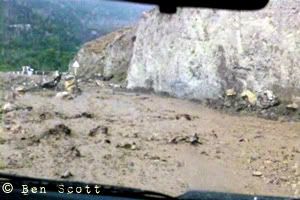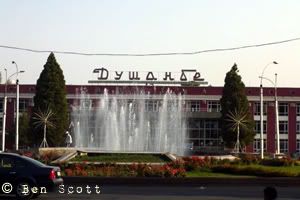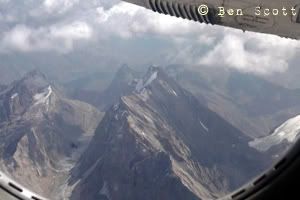by Ben S.
To see the complete set of photographs from Ben's trip to Tajikistan,
please CLICK HERE.
The first thing about Tajikistan is the soup our driver buys us. It is pungent and herby and full of flavour and noticeably lacking in mutton fat, congealed or otherwise. Its scent is as full of the promise of a new land as the brightly coloured shawls of the female customers at the small cafe and the undulating tones and strange syllables of the language they speak. Afghanistan and Iran seem just a breath away, Russia and Turkey’s influence left far behind to the north. This Central Asia, it is altogether new and exciting and different. It is not my Central Asia. I have three days.
“Three days? ! That’s not enough time to see our country!”
At the insistence of the consul, I have dutifully sat at a table in the corner of the Tajik embassy in Bishkek, and in my neatest handwriting composed what I hope is an acceptable self-written letter of invitation to get me my Tajik visa. The walls of the embassy are full of photos promising what beautiful wonders await the visitor to her country. Most of them were taken in Uzbekistan, showing Samarkand and Bukhara, fabled cities of beauty lost to hastily drawn lines on Stalin’s map. Few seem to show anything of the country itself. The photos hark back to the glories of a lost past rather than to the realities of the present. I make my best apologetic pained expression and explain that I only have a week of vacation, and a flight to catch out of Dushanbe at the end of that week. I hope to return to this beautiful country sometime in the future so I can truly appreciate its famous beauty. There is no problem, a visa is granted, the consul just wishes I could have more time to fully enjoy her country. I am going.
The Uzbek-Tajik border is slow and hot and laborious and full of paperwork. Three of us cross one way, two cross back the other. The border is closed for lunch but I am fortunate enough to meet Tanja and Jochem on the Uzbek side. Tanja charms the gun-toting guards and they let us through. We are ushered from gunman to gunman and each time escape without paying a single Somani. Tanja and Jochem know all about me and my life because they have overheard me talking with a curious Uzbek woman the night before in Samarkand. They are nice people and we decide to share a taxi together to Penjikent town. Our taxi driver buys us soup and takes us on a tour of the ruined city. All is dust and barren mud, the ruins of an ancient Sogdian civilisation crumbled into holes in the ground and remnants of what may have been walls. Penjikent fries in the harsh sun hundreds of metres below.
To see the complete set of photographs from Ben's trip to Tajikistan,
please CLICK HERE.
The first thing about Tajikistan is the soup our driver buys us. It is pungent and herby and full of flavour and noticeably lacking in mutton fat, congealed or otherwise. Its scent is as full of the promise of a new land as the brightly coloured shawls of the female customers at the small cafe and the undulating tones and strange syllables of the language they speak. Afghanistan and Iran seem just a breath away, Russia and Turkey’s influence left far behind to the north. This Central Asia, it is altogether new and exciting and different. It is not my Central Asia. I have three days.
“Three days? ! That’s not enough time to see our country!”
At the insistence of the consul, I have dutifully sat at a table in the corner of the Tajik embassy in Bishkek, and in my neatest handwriting composed what I hope is an acceptable self-written letter of invitation to get me my Tajik visa. The walls of the embassy are full of photos promising what beautiful wonders await the visitor to her country. Most of them were taken in Uzbekistan, showing Samarkand and Bukhara, fabled cities of beauty lost to hastily drawn lines on Stalin’s map. Few seem to show anything of the country itself. The photos hark back to the glories of a lost past rather than to the realities of the present. I make my best apologetic pained expression and explain that I only have a week of vacation, and a flight to catch out of Dushanbe at the end of that week. I hope to return to this beautiful country sometime in the future so I can truly appreciate its famous beauty. There is no problem, a visa is granted, the consul just wishes I could have more time to fully enjoy her country. I am going.
The Uzbek-Tajik border is slow and hot and laborious and full of paperwork. Three of us cross one way, two cross back the other. The border is closed for lunch but I am fortunate enough to meet Tanja and Jochem on the Uzbek side. Tanja charms the gun-toting guards and they let us through. We are ushered from gunman to gunman and each time escape without paying a single Somani. Tanja and Jochem know all about me and my life because they have overheard me talking with a curious Uzbek woman the night before in Samarkand. They are nice people and we decide to share a taxi together to Penjikent town. Our taxi driver buys us soup and takes us on a tour of the ruined city. All is dust and barren mud, the ruins of an ancient Sogdian civilisation crumbled into holes in the ground and remnants of what may have been walls. Penjikent fries in the harsh sun hundreds of metres below.

We negotiate for transport to Dushanbe for an hour before agreeing to pay $100 for a car to take us over the mountains to the city. I stand around chatting to the town’s English teacher. He can’t speak much English but is happy to have the chance to practice with a native speaker. There is but one in the town.
“Don’t take the road from Penjikent to Dushanbe. It’s too dangerous!”
An email from the town’s English speaker tells me that the road is closed all day for rebuilding by Chinese crews and that traffic can only make the drive from 6pm, in the dark, on an unbuilt, rocky, hole-strewn road winding through the high mountains above gaping chasms with no safety barriers. People regularly die on this road in the darkness, as drivers are often drunk, drive too fast and with no care for safety. I am strongly advised to enter Tajikistan further south and take the direct route to Dushanbe. Do NOT take the road from Penjikent to Dushanbe!
On the road from Penjikent to Dushanbe, we leave town under the watchful eye of a poster of the dear president (who is surrounded by a bevy of admiring prepubescent schoolgirls) and it begins to rain. The road disappears and becomes a river of mud sliding over the edge of a cliff. I take pictures and wonder if I should have heeded the advice not to take this road. All is nothingness, just bare earth, towers of rock and the omnipresent chasm waiting to devour us. I feel like a hobbit entering Mordor.


At Ayni we are stopped and our passports examined. We join a convoy of traffic idling, waiting for the gate to open so we can proceed to drive into the high mountains to the capital. Three teenagers come and chat to us in English. They like living in Ayni but want to move one day to the big city. They speak better than the English teacher in Penjikent. One day they want to go to America.
The gate opens as dusk falls, and we roar off in dust and a hail of small stones. Nothing can be seen through the windscreen and I wonder how our driver knows where the road ends and begins. Maybe he doesn’t. We rest at a small tea shop perched above another chasm, and eat delicious meat and drink tea from dainty cups. Night falls and it turns cold. I walk away from the cafe and there is nothing but silence, blackness and a million stars spangled across the sky. I feel very far away from home. My friends in Kyrgyzstan were worried about me making this trip, speculating over whether or not I would come home dead. I feel very much alive, and young, and free, and adventurous. I am on the road from Penjikent to Dushanbe and the world is at my feet.
Back in the car and we are driving again, alone this time as the convoy has long gone ahead of us. In the blackness we can only imagine the outlines of the mountainous walls of rock looming above us. The chasms are still visible, their blackness being even darker than that of the sky. We approach the edge often to drive around gaping holes in the road and to pass the abandoned machinery of the road-builders, but the tyres stay on course. Eventually we enter the Varzob tunnel, where dull strip lighting shows us that the water is tyre-deep, and we see the wires hanging from the ceiling and industrial detritus scattered around like post apocalyptic confetti. We are swallowed by the earth into its eerie dankness before finally being disgorged into yet more darkness on the other side. The stars reappear and light our way to Dushanbe.
The president’s house on the edge of town is bigger and more brightly lit than those of the surrounding heroin barons. Gaudily festooned with fairy lights for a dinner of the heads of states of the Shanghai conference, who will be arriving in town tomorrow, it is reminiscent of a doll's house on crack. It is thoroughly absurd after the shacks of the Tajik mountain villagers and given the electricity crisis that has plagued the region. For the convenience of the esteemed guests, the road will shortly be closing, so our driver puts his foot down so we can make it into Dushanbe.
It is midnight and we arrive in Dushanbe hours ahead of schedule, with nowhere to stay. Our driver would put us up at his house, but it is a little cramped as he has many children. He takes us to the taxi driver’s hostel, a house squatting under the belching stack of the city’s cement factory. For 3 Somani we have some blankets on the floor and a teapot. A gruff Tajik man brings us tea. I am the first Englishman he has seen, and he proclaims that he will judge all of my kind based on his encounter with me. I am not sure if this is a good thing or not. At least, like Belarusian Tanja, I am not known for my lack of generosity and failure to bring flowers when visiting a house. All Belarusians are like this. There is no room for individuality; the constraints of nationality define us as human beings.

The next day we wander into the city. The streets are litter-free and suspiciously clean. Men in suits and sunglasses stand on every street corner, watching passersby and talking into their radio headsets. Propaganda proclaims the marvelousness of the Shanghai Conference, the greatness of the president, the unending ties between Tajikistan and the People’s Republic of China. The buildings are built in endearing shades of pastel and the avenues lined with trees. It is a pretty place, with fountains and photogenic architecture. It seems much smaller, calmer and more genteel than other Central Asian cities, and we encounter no hassle from the police anywhere. We make the mistake of deviating from the established route in the National Museum and are sternly rebuked for doing so. I see a giant reclining Buddha, and search for postcards. My favourite postcard shows the headquarters of the National Bank. Why would anyone come to Tajikistan for pointless road trips amid the high mountain beauty of the Pamirs when they could spend time admiring the National Bank instead? Crazy foreigners.
My hotel for the night is the Vakhsh, a pretty pastel building hiding a damp threadbare exterior. I am not allowed to check in, as I am foreign and strange. Tanja returns to help me purchase a room for the evening. Soviet solidarity eventually pays off and I am in. $30 buys me a sagging bed and bathroom with noisome and recalcitrant plumbing. Scowls from the receptionist are free of charge. I meet Tanja and Jochem for Ecuadorian food in the north of the city. Salsa is undoubtedly the best Ecuadorian restaurant in Central Asia. I walk back alone through the city. There is nobody on the street besides a horde of militisya. Not one troubles me for some Dollars or even Somani. I wonder if I am still in Central Asia, or possibly hallucinating.
“The flight has already gone!”
The next morning there is trouble at the airport. A baying horde are wailing at the entrance, demanding to be allowed to go to Moscow. I ask the man in uniform when I can check in for my flight to Bishkek. I am told that the flight has already left, even though it is not due for another four hours. Customs officers carry melons and leave them in a side office. The bringers of melons are allowed through to the coveted check-in area. I wonder where I can buy some melons to give as my own bribe. I ask at the information desk about the flight to Bishkek and am told no. I’m not sure what ‘no’ means, but I don’t think it’s good. A pretty young Tajik woman standing next to a fat sweating white man tells me to wait with them, as the fat man is also headed for Bishkek. He is from Arkansas and is in town to close down a company. He seems pleased by this. He doesn’t speak Russian and doesn’t like it here. The Tajik woman, who is charming and enthusiastic, is his fixer. Another Tajik joins us. She speaks excellent English and works for Help the Aged. She is off to Bishkek for work, and will soon be going to Brighton for a conference. I am asked what Brighton is like. I describe this cosmopolitan, bohemian seaside city but leave out the part about its thriving gay life. I’m not sure if it will go down well. She is only the second Central Asian I’ve met who has either been, or is going to, my country. The other one also worked for an NGO.
“But my secretary organises things like that for me!”
Eventually our flight is called (Ben 1, man in uniform 0) and we proceed to check-in. At immigration, it turns out that Arkansas dude hasn’t got a Kyrgyz visa and won’t be allowed to proceed through customs. NGO lady thinks he is stupid, and from her smile I can tell that fixer lady agrees. Fixer lady passes me into the care of NGO lady, and I whisk through customs without needing to open my wallet. An immigration guy with an eye for opportunity sighs as he looks at my passport and asks where my migration pass is. NGO lady scolds him and tells him to cut out his nonsense, and he withers under her gaze. I am through, and continue telling her about Brighton.

The flight back is on Kyrgyzstan Airlines, who are barred from entering EU airspace. I am served a nice in-flight meal and, while the seats do rattle and it is too noisy to speak, the flight is not unpleasant. We land back at Bishkek and I am besieged by taxi touts quoting me absurd prices to get to Bishkek. I am home. At my school compound, I am greeted by the director who cheerfully announces that she is surprised I made it back, and that many of the staff thought I wouldn’t make it. I bring giardia back with me and am sick for days. I lose so much weight I need a new hole stamped into my belt to hold my trousers up.
I meet Tanja again some months later on a cold day in England. She is in the country for a conference and we decide to meet up at an Iranian restaurant in the inner suburbs of London. It is nice to see her again and we reminisce about journeys taken and talk about journeys yet to come. The stew arrives, herby and pungent and full of promising aromas.
The Tajik consul in Bishkek, I think she may have been right.

The road travel needs to improve in Tajikistan. shitifujon.blogspot.com
ReplyDelete